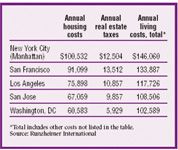Article
UPDATE
On finance and practice
Another way to be charitable


Lost your cell phone? Act fast
You could be stuck with the bill if you lose your cell phone and someone else uses it, although the specific guidelines for getting charged depend on your carrier. For example, Cingular Wireless will hold you responsible for all charges until you report the theft to the police, get a report number, and give that number to the company's customer service department. T-Mobile USA will wipe away unauthorized phone charges if you notify the company immediately and get a police report to them within 14 days. Verizon Wireless says you won't be liable for charges as long as you notify them within 24 hours. The Federal Communications Commission can't help you because it doesn't regulate customer contracts with wireless carriers. Best advice: Let your carrier know as soon as you discover your cell phone missing.
If you can't afford the Big Apple ....

..... try the Plains
Towns in Kansas and Nebraska are offering free land to folks who are willing to build a house on it and move in. Lots from 4,650 to 14,300 square feet are available in Herndon, KS, as long as you start building within six months of getting your house plans preapproved. Or, if Herndon doesn't catch your fancy, you could try Curtis, NE, where you can get a lot on a paved street with all utility lines in place. To see what else is free, go to http://www.kansasfreeland.com or visit a Nebraska Library Commission website at http://www.nlc.state.ne.us/nsf/FAQ/freeland.html. A new website, http://www.nebraskafreeland.us is coming soon.
Uncle Sam's latest quality initiative
CMS will launch a voluntary reporting program next January for physicians who want feedback on their care. Initially, 36 evidence-based performance measures-developed in collaboration with physicians, physician organizations, and others-will serve as the foundation on which doctors' services will be rated. (Additional quality measures may be phased in during the year.) To collect the information, CMS will use G-codes that will supplement the claims data doctors currently submit. Physicians will receive feedback to help improve their data accuracy, reporting rate, and clinical care. The agency also plans to seek input from participating doctors on ways to improve both the ease of reporting and the usefulness of the quality measures.
But the Medical Group Management Association took issue with CMS' rush to implement the program. The group warned that the timeline for implementing the program was too short to allow for necessary software updates and the redesign of workflow between clinical and coding/billing staff.
A PHO comes to terms with the FTC
Without admitting guilt, Partners Health Network, a physician-hospital organization based in Easley, SC, has agreed to settle FTC charges that it illegally negotiated fees for its 225-odd physician members. The FTC alleged that Partners Health fixed prices by refusing to deal with health plans that wouldn't accept its fee schedule. The FTC concluded that the PHO engaged in no efficiency-enhancing integration that would justify its joint fee negotiations.
Under the consent agreement, Partners can enter into joint arrangements that are "reasonably necessary" to lower costs and improve the quality of care but, for three years, must notify the FTC before doing so. The consent order, which also contains compliance and reporting requirements, calls for Partners to terminate its current contracts with physicians within one year.





